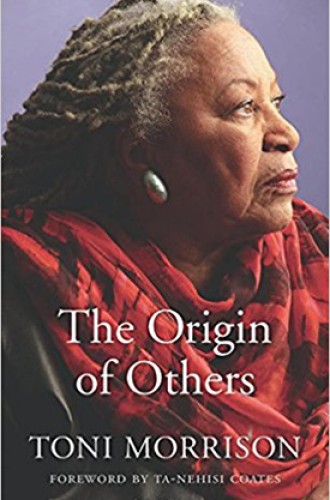Toni Morrison on the invention of the stranger
Morrison examines how Western authors define their culture by estranging others.
Hers “was not a story to pass on,” but one to be forgotten, an easy enough thing to do since there was nothing left of her to remember except “the one word her mother could have afforded to have inscribed on her tombstone, Beloved.” And yet her footprints still “come and go, come and go,” just as Toni Morrison promised.
They appear this time in the pages of Morrison’s latest excavation of the Western canon in search of the origin of others, where readers rediscover “Beloved the girl, the haunter, [who] is the ultimate Other.” Far more is represented by the ghost of Morrison’s “speaking, thinking dead child” in Beloved than the “sixty million and more” dead African slaves to whom the novel is dedicated. In this new work, Morrison continues to grapple with the savagery and gothic sensibilities of slavery and still has much to say about the relics of people left in its wake.
Read our latest issue or browse back issues.
The Origin of Others is a critical literary and cultural analysis of Western literature’s role in determining the way the culture perceives difference. In these essays, Morrison provides the same kind of “controlled wilderness” that she uses to create experiences of otherness in her fiction, fusing rich details and depth of perception to position the reader to relate to others “with sympathy, clarity, and the risk of self-examination.”
Those familiar with Morrison’s works will notice her return to the theme of “the foreigner’s home,” a concept she’s been mulling over since she was guest curator at the Louvre Museum in 2006. And the matter of “how the construction of blackness . . . allows whites to explore their own bodies through the surrogacy of a debased Other” was explored in her 1992 work Playing in the Dark. The book is based on her 2016 Charles Eliot Norton Lectures at Harvard University on “the literature of belonging,” and the sense of belonging is the heart of the matter, an emotional thread that Morrison knots at the beginning of the book with a personal story of when she first learned about not belonging. It was the moment her great-grandmother, “staring at me and my sister . . . frowned, pointed her cane at us, and said, ‘These children have been tampered with.’” With those few words, “the damage was done”—she and her sister went from being children playing on the floor to something sullied, impure, “lesser, if not completely Other.” This story to set the context for her analysis of words for the invention of others, exemplifying how “Othering” occurs as linguistic acts that have both personal and social implications.
Othering has a long history that Morrison extends back to the eugenics of scientific racism, in which the concept of race became something other than simply a classification of species. Although the human race is the only proper scientific designation for all people, scientific racism has provided much fodder for a “racial-ized ranking of people” based on such arbitrary differences as culture, physical traits, religion, etc.
Morrison suggests that the real damage was done when these pseudo-scientific configurations of otherness became concretized in classic Western literature, from the colonially controlled “literary Africa” to the ideologically imbued characterizations of others by such greats as William Faulkner and Ernest Hemingway. Even in a work like Harriet Beecher Stowe’s Uncle Tom’s Cabin, which many regard as critical of slavery, Morrison finds evidence of efforts to “romance slavery” and perpetuate a view of the enslaved as “the Other.”
Only in certain representations of the stranger, as in Flannery O’Connor’s short story “The Artificial Nigger,” does Morrison find in Western literature an honest attempt to address the process of inventing Others and its motivations. When O’Connor’s protagonist, Mr. Head, uses a day trip to Atlanta to teach his young nephew racism, it signifies to Morrison a profoundly perceptive reading of the social and psychological function of the stranger for securing the status of white superiority.
Defining one’s self by estranging others is a human tendency, and Morrison admits her own vulnerability to it even as she discusses her attempts to break free of it in her novels Bluest Eye, Paradise, God Help the Child, and Beloved. This is perhaps one reason why Ta-Nehisi Coates, in the book’s foreword, places Morrison “among those who understand the hold [this] history has on us all.”
Morrison underscores the implications of othering in a globalized world, where she estimates that the number of the displaced “far surpasses sixty million.” That this figure matches her calculation of the enslaved is hardly a coincidence, especially given other equally significant similarities between today’s “transglobal tread of peoples” and the mass movement of the Atlantic slave trade.
Fighting against the horror of history possibly repeating itself, Morrison sets out “to use literature to comment on the bane (the poison) of foreignness” and “de-fang cheap racism.” Tracing the origin of others through Western literature allows her to discern within the present sociopolitical and economic pressures of globalization “the inside/outside blur that can enshrine frontiers and borders—real, metaphorical, and psychological—as we wrestle with definitions of nation, state, and citizenship as well as the ongoing problems of racism and race relations, and the so-called clash of cultures in our search to belong.” For others past and present (not least of which are the “sixty million and more” refugees and victims of human trafficking), Morrison wants to demystify the dangerous dystopia that emerges at “the borders, the porous places, the vulnerable points where the concept of home is seen as being menaced by foreigners.”
For those who want to understand better the process of inventing others, its literary past, and the tendency in us all to dismiss others clamoring for a sense of belonging, The Origin of Others is a must-read. Morrison’s fans will appreciate her hauntingly clear reading of the times, even while she remains true to her literary aesthetic. New readers can look to this text as a foray into the mind of one of the greatest thinkers of our time. With the same revolutionary simplicity as Martin Buber’s I and Thou, Morrison reminds us once again that whatever can be said of the self is always determined by how one stands in relation to the other—a point poignantly articulated in the epigraph of Beloved: “Those who were not my people I will call ‘my people,’ and her who was not beloved I will call ‘beloved’” (Rom. 9:25).






